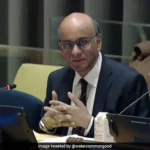In a significant step towards addressing the long-standing issue of ethnic reconciliation involving minority Tamils in Sri Lanka, President Ranil Wickremesinghe has scheduled an all-party meeting to discuss the Government’s National Reconciliation Programme and chart a way forward. The much-awaited meeting, set to take place on Wednesday, marks a critical development in the country’s efforts to foster harmony and inclusivity among its diverse population.
The President’s decision to convene an all-party gathering reflects his commitment to fostering dialogue and cooperation between various political factions to find a comprehensive solution to the ethnic tensions that have persisted in Sri Lanka. With representatives from all major political parties participating, the meeting is expected to facilitate a robust and inclusive exchange of ideas, ensuring that all voices are heard in the process of reconciliation.
The timing of the meeting is noteworthy, as it closely follows President Wickremesinghe’s recent two-day visit to India, during which he engaged in high-level discussions with Prime Minister Narendra Modi. The meeting with PM Modi undoubtedly provided valuable insights and perspectives, as India has had its share of experiences with ethnic reconciliation and could offer crucial guidance to its neighbor.
The main agenda of the all-party meeting is centered around the Government’s National Reconciliation Programme. This ambitious initiative aims to address historical grievances, promote inter-ethnic understanding, and foster a sense of belonging and equality among all communities in Sri Lanka. By bringing together representatives from different political spectrums, the President seeks to ensure that the reconciliation program is designed to garner widespread support and cooperation across party lines.
The ethnic issue involving the Tamil minority has been a persistent challenge in Sri Lanka’s modern history, marked by periods of violence and unrest. Reconciliation efforts have faced setbacks, and various attempts to find a lasting solution have yielded limited results. However, President Wickremesinghe’s commitment to convene this all-party meeting indicates a renewed determination to break the impasse and pave the way for a more inclusive and harmonious Sri Lanka.
As the country moves forward, the President and participating parties will need to navigate complex issues, including devolution of power, equitable distribution of resources, and recognition of minority rights. Achieving genuine reconciliation will require compromise and a genuine commitment to work towards the collective well-being of all Sri Lankans, regardless of their ethnic or religious backgrounds.
International observers are closely watching these developments, with neighboring countries and global partners offering their support for a peaceful resolution. The international community recognizes the potential of a stable and united Sri Lanka, not only for the well-being of its citizens but also for regional stability and cooperation.
While the road to reconciliation may be challenging, the all-party meeting is a vital step towards engaging in a constructive dialogue, fostering understanding, and building consensus on the way forward. It is hoped that this inclusive approach will create an environment where past grievances can be addressed, grievances can be addressed, and lasting solutions can be formulated.
President Ranil Wickremesinghe’s decision to convene an all-party meeting on ethnic reconciliation signifies a commitment to finding a collective solution to the longstanding issue of minority Tamil representation in Sri Lanka. This move, closely following his visit to India, demonstrates a willingness to learn from the experiences of other countries in similar circumstances. The success of the meeting will largely depend on the spirit of cooperation and genuine dialogue among political factions, laying the foundation for a more inclusive and harmonious future for Sri Lanka. As the world watches, the hope is that this crucial step will lead to a brighter and more peaceful era for the island nation and its diverse population.









